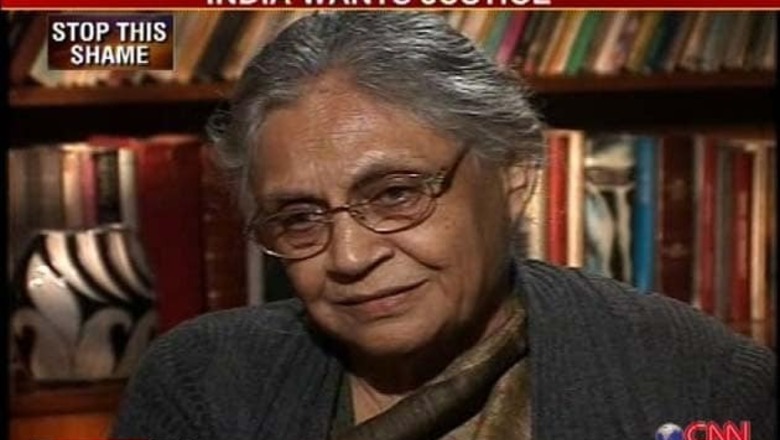
views
New Delhi: Eyeing Assembly polls next year, the Delhi government went into overdrive in 2012 doling out sops and regularising unauthorised colonies but the barbaric gangrape of a young girl brought shame to the city and triggered a blame game between Chief Minister Sheila Dikshit and the police. After BJP handed a crushing defeat to Congress in the municipal polls in April, a worried Dikshit put her government into fast gear and launched several welfare schemes.
While presenting a Rs 33,436 crore annual budget in May, she announced a major food programme to provide monthly cash subsidy of Rs 600 directly into Aadhaar-linked bank account of the senior-most female member of two lakh poor families which were not covered by the public distribution system. The Dilli Anna Shri Yojna, claimed to be first in the country, was launched in December by UPA Chairperson Sonia Gandhi amid signals that cash transfer scheme beginning from the New Year in 51 districts across the country could be the Congress' trump card in the 2014 Lok Sabha polls.
In August, the government came out with another ambitious scheme to provide free LPG cylinders and gas stoves to over 3.5 lakh BPL families at a cost of Rs 100 crore in 2012-13. The primary aim of the scheme was to make Delhi the first kerosene-free city of the country.
A month later, the government regularised 895 of 1,639 unauthorised colonies which are home to nearly 50 lakh people and considered traditional vote bank of Congress. Dikshit had pushed hard the regularisation process after Congress' drubbing in municipal polls.
At the fag end of the year, Dikshit triggered a controversy by sending a letter to Union Home Minister Sushil Kumar Shinde, seeking an inquiry into alleged "interference" by senior officials of Delhi Police while a sub-divisional magistrate was recording the statement of the gangrape victim. Police Commissioner Neeraj Kumar hit back at Dikshit rejecting the allegations.
Seen as Dikshit's effort to insulate her government from any criticism for the brutal gangrape, she also attacked police for excessive use of force while handling protests against the incident and even demanded resignation of Kumar. The chief minister effected a reshuffle of her cabinet in August in which senior minister AK Walia was divested of key departments of Urban Development and Revenue. Arvinder Singh Lovely was relieved of Education and Transport departments and was given Urban Development and Revenue ministries.
In the health sector, rising cases of dengue in summer months kept the government on its toes while it come under sharp attack following death of four patients at the ICU of a state-run hospital due to alleged snapping of oxygen supply. Earlier in the year, the government launched another scheme under which around 35 lakh children in the age group of two to 17 were provided chewable deworming tablets at all state-run schools to rid children of worm infestation. The scheme was envisaged after a study found 16 per cent children in the city are infected by worms.
The government also enforced a blanket ban on manufacturing, sale, storage and display of all gutka products in the city. The ban was imposed on pan masalas and similar products containing nicotine and tobacco. To ramp up transport infrastructure, the government decided to set up a monorail network in East Delhi covering around 11 km of congested areas where extension of metro network is not feasible.
For the second successive year, the government failed to arrange natural gas to feed its 1,500 MW capacity power plant at Bawana which was built at a cost of Rs 4,500 crore as Reliance Industries Ltd did not supply gas to the plant notwithstanding directions from the Oil Ministry. In wake of number of incidents of building collapse, the government had come out with a broad policy under which potentially weak buildings were to be surveyed and retrofitted in a phased manner but nothing concrete happened on the ground.
In July, Delhi reeled under severe water shortage after Haryana cut supply of raw water to Delhi and Prime Minister Manmohan Singh had to intervene in resolving the crisis. The city government came under sharp attack after power regulator DERC hiked the tariff by 26 per cent hike for domestic consumers in June. Unfazed by criticism, Dikshit, however, justified the hike saying it was done to ensure uninterrupted power supply.
As collapse of the Northern Grid in July triggered severe power cuts in the national capital, Delhi Government in corporation with Union Power Ministry launched the Islanding facility to insulate essential services from such incidents. The government took a number of eco-friendly measures in the year which include declaring the humble house sparrow as state bird of Delhi and clamping a blanket ban on manufacture, sale, storage and use of plastic bags in the national capital which come into effect from November 22.
Following Centre's decision to allow FDI in multi-brand retail, Delhi government took steps to make Delhi first city in the country to have stores of multinational retail giants Walmart and Tesco. In November, the government hiked the circle rates - the minimum valuation at which properties have to be registered with the government - by up to 200 per cent mainly to check black money component in property transactions.













Comments
0 comment